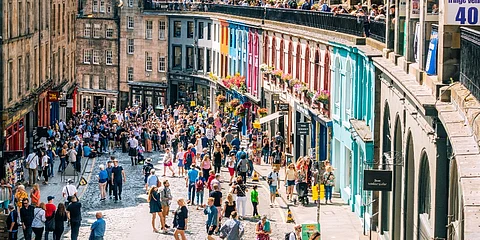
- Destinations
- Experiences
- Stay
- What's new
- Celebrating People
- Responsible Tourism
- CampaignsCampaigns
- SubscribeSubscribe
- Buy Now

Every August, the city of Edinburgh turns into the epicentre of global arts and performance, hosting the world’s largest and most diverse arts festival: the Edinburgh Festival Fringe. Returning again from August 1–25 2025, the festival continues its legacy as an open-access platform where artists from around the world showcase their work across genres—right from theatre and dance to comedy, circus and even the diminishing art of spoken word. In 2025, the Fringe will feature over 3,300 shows, confirming its position as a major cultural force in the global events calendar.
The origins of the Fringe go as far back as 1947, when eight theatre groups, uninvited to the inaugural Edinburgh International Festival, turned up, took the centre stage and performed independently. Their actions sparked a radical movement that gave rise to the concept of a “fringe” festival—unjuried, inclusive, and open to all. Ever since then, the Fringe remains true to the spirit that had prevailed during its dawn and welcomes anyone with a story to tell and a space to perform.
Even though the festival is still a month away, the 2025 edition of the Fringe has already seen strong momentum. More than 1,200 shows were announced in the first wave, and early ticket sales suggest that the record-breaking attendance of previous years may be surpassed. Such has been the response. The programme includes a whopping 3,400 shows approximately across 265 venues, with a significant rise in new work, debut performances, and productions that tend to blur the boundaries defined by genres.
As a peak into the 2025 edition, the lineup includes standout theatre performances like Cliff Cardinal’s unconventional Shakespeare reinterpretation and Jack Holden’s immersive nightclub-set drama. In dance and circus, internationally acclaimed companies such as Circa and Gravity & Other Myths are set to debut highly anticipated shows. Comedy remains a major draw, with well-known names and rising stars sharing the bill.
Edinburgh’s venues are as varied as the shows they host. Major hubs like Assembly, Gilded Balloon, Underbelly, and Pleasance return with full programmes in spaces that range from historic halls to pop-up tents. Summerhall continues to be a haven for experimental and visual arts, while the PBH Free Fringe offers a parallel programme of no-cost performances, allowing accessibility for both performers and audiences.
New and alternative venues have also made it to this year’s landscape, with emerging initiatives like “Shedinburgh” supporting debut acts in smaller, intimate spaces.
The Fringe Society, the charity that supports the festival, plays a crucial role in managing logistics, ticketing, and access—the sole arbiter, you can say. It does not curate or censor content, staying committed to the festival’s open-access, come one, come all principles. In 2025, the Society has specifically prioritised accessibility, with a continued focus on wheelchair access, relaxed performances, and discounted ticket schemes to broaden audience reach.
This year’s programme celebrates diversity and inclusion, with themes ranging from climate activism and queer joy to technological change and feminist rebellion.
Beyond the spectacle, the Fringe is also a major economic engine. In recent years, it has single handedly contributed over EUR 400 million to the Scottish economy, drawing hundreds of thousands of visitors, artists, and media professionals. The festival also provides an unmatched platform for emerging talent, offering exposure that can potentially launch national and international careers.
Despite its popularity, the Fringe seems often to be confronted by logistical hurdles. The 2025 edition overlaps with major concerts by timeless British bands like Oasis and AC/DC at nearby Murrayfield Stadium, which has led to concerns about rising accommodation costs and reduced availability. Some Fringe organisers have also reported slower early bookings, prompting targeted marketing efforts to engage local audiences and concertgoers.
Affordability and sustainability, too, continue to be pressing issues. The cost of staging a show remains high for many artists, raising questions about accessibility for less-funded performers. The Fringe Society and participating venues are actively exploring support models, bursaries, and community funding to mitigate these barriers.
Book Early: With thousands of performances, many sell out in advance—especially in comedy and theatre.
Mix It Up: Pair large venues with smaller ones to experience the full range of creative voices.
Stay Smart: Accommodation fills quickly; consider areas like Leith or Newington for budget-friendly options.
From all accounts, the Edinburgh Festival Fringe 2025 is expected to be a vibrant, thought-provoking, and completely joyful celebration of creativity in all of its forms. By finding a balance between tradition and innovation, artistic freedom and the realities of funding and access, the Fringe has consistently shown why it is one of the most significant cultural phenomenons in the modern world. Regardless of skill level, everyone may enjoy this year's festival, which serves as a powerful reminder of the value of the arts.
